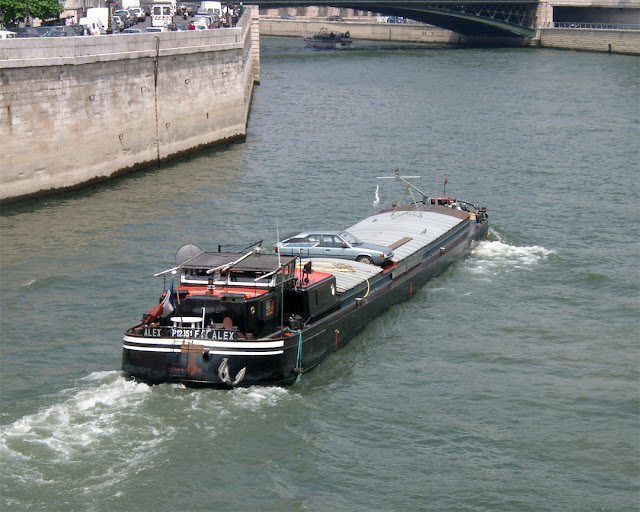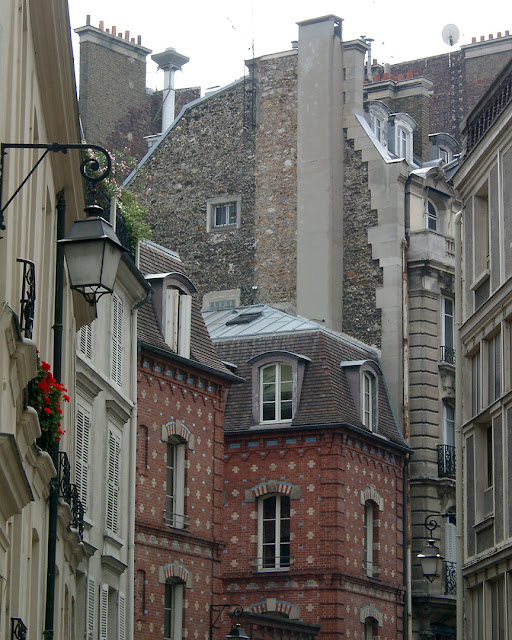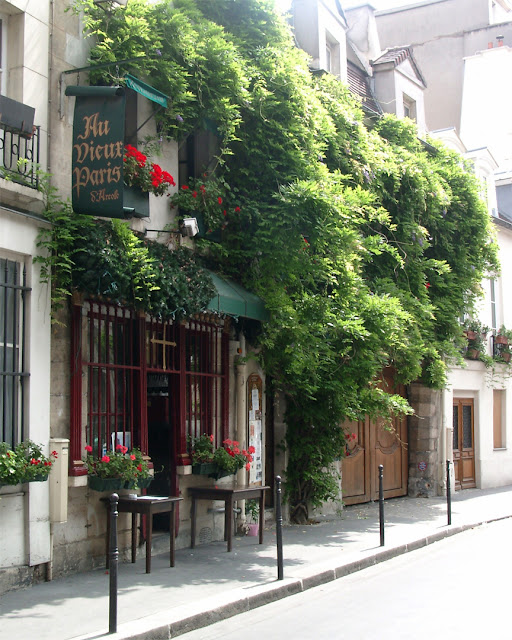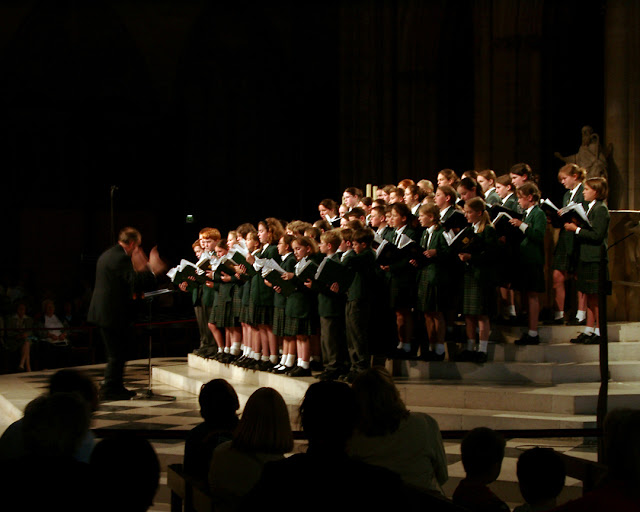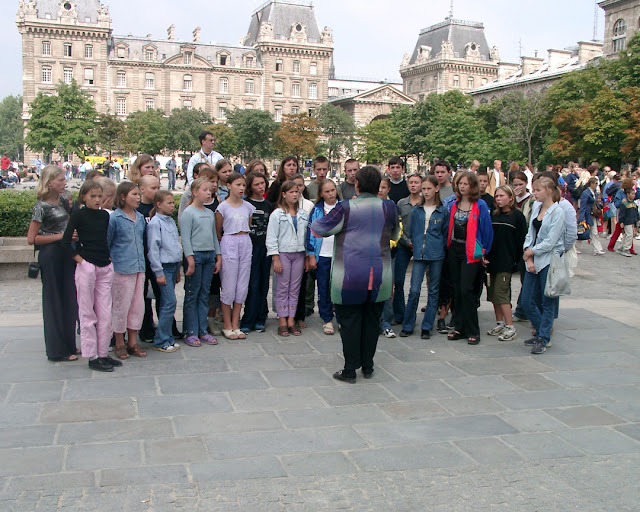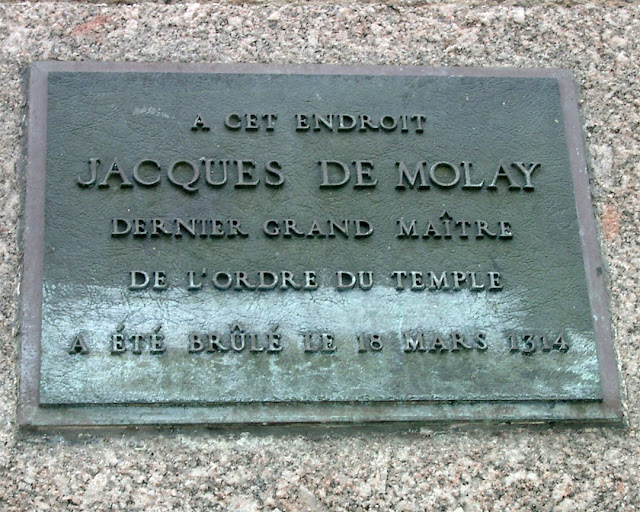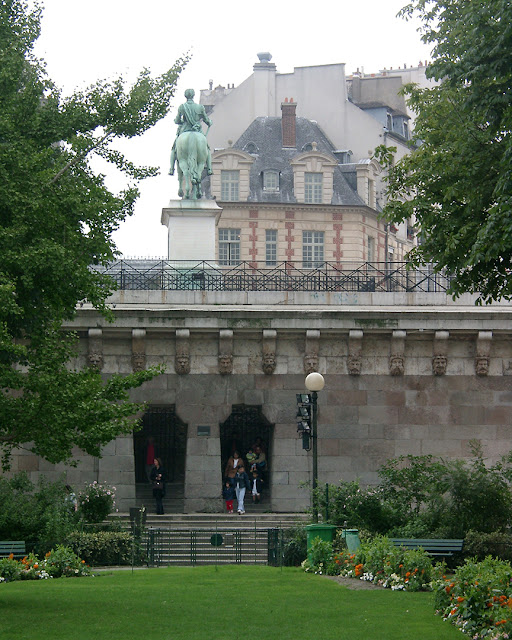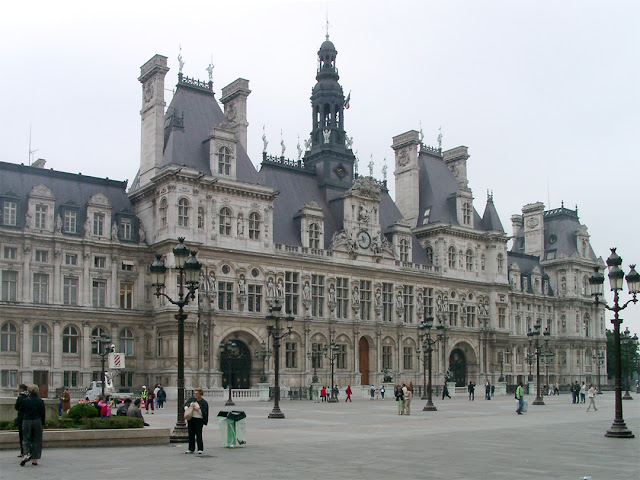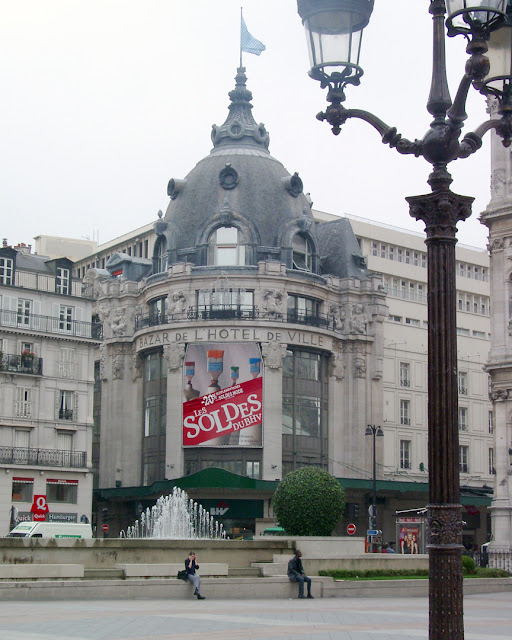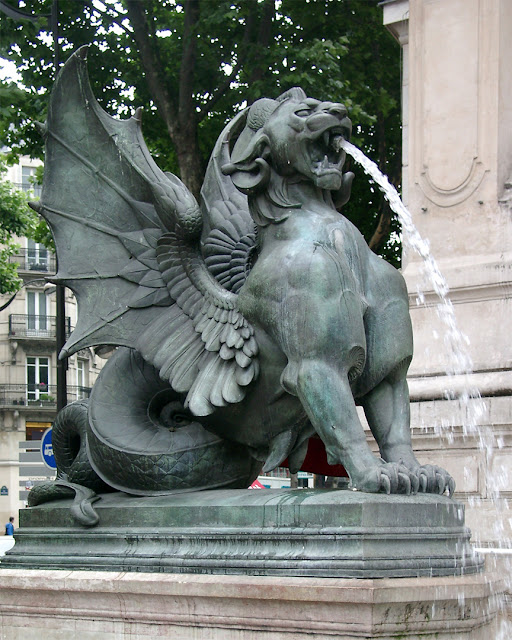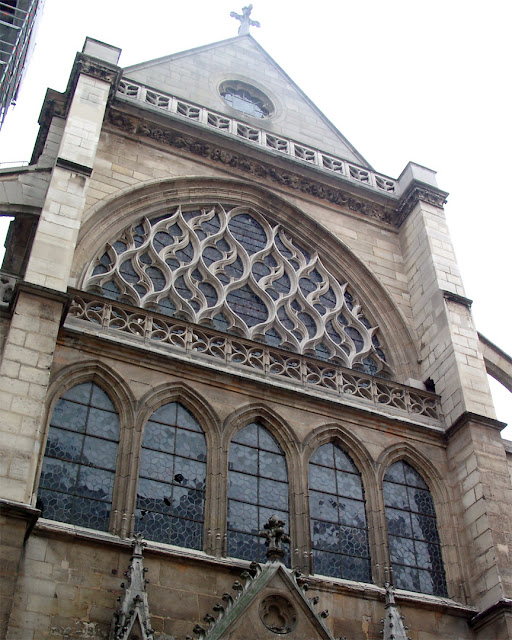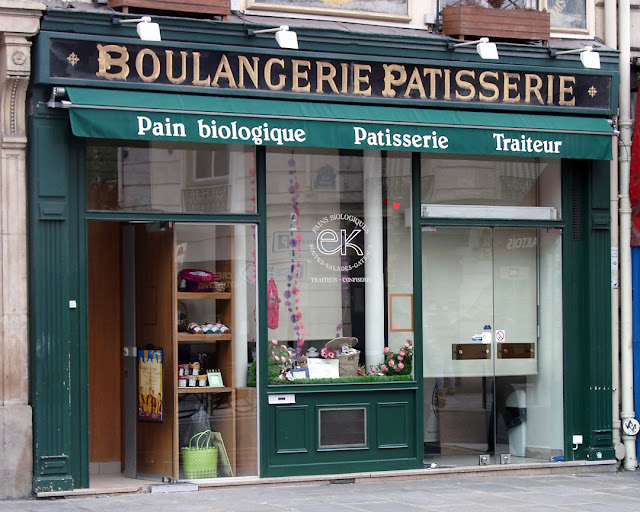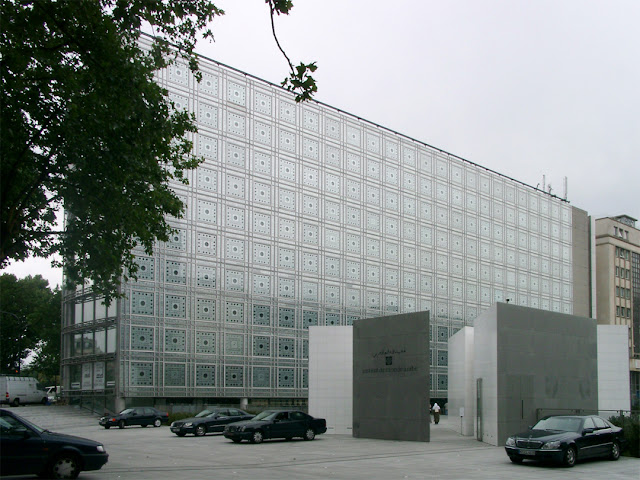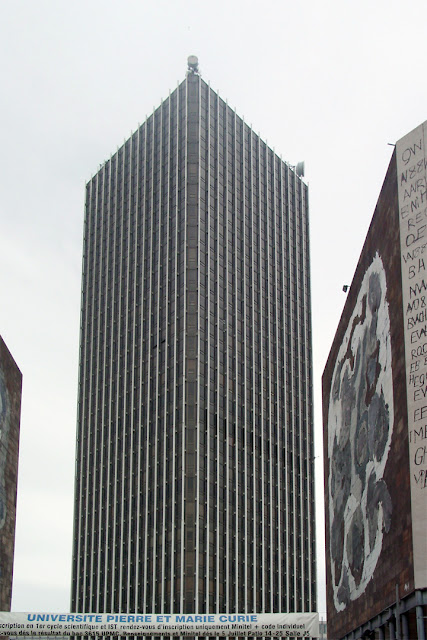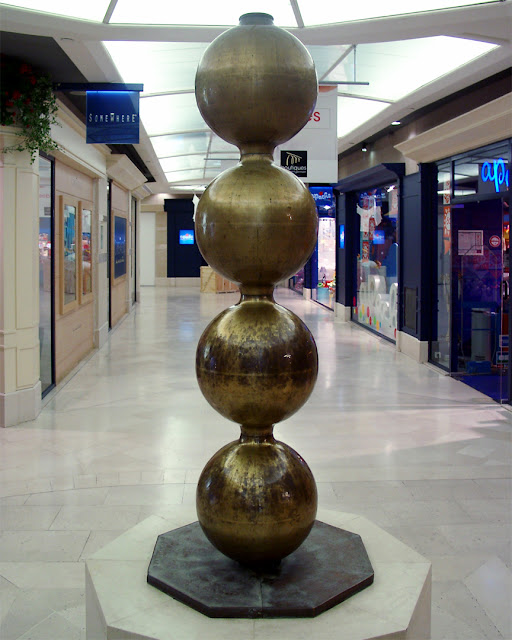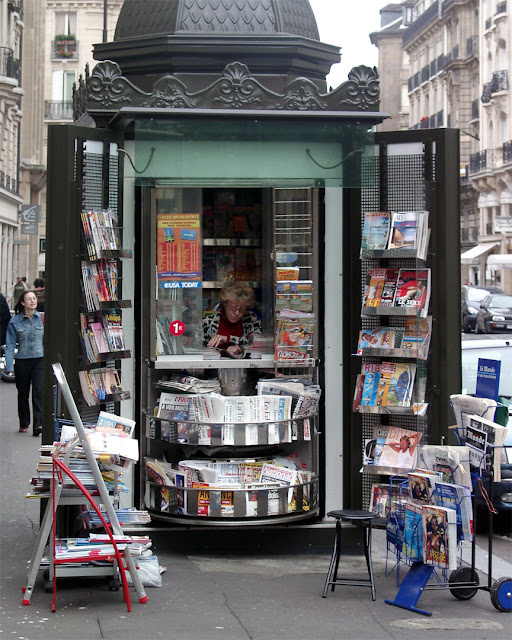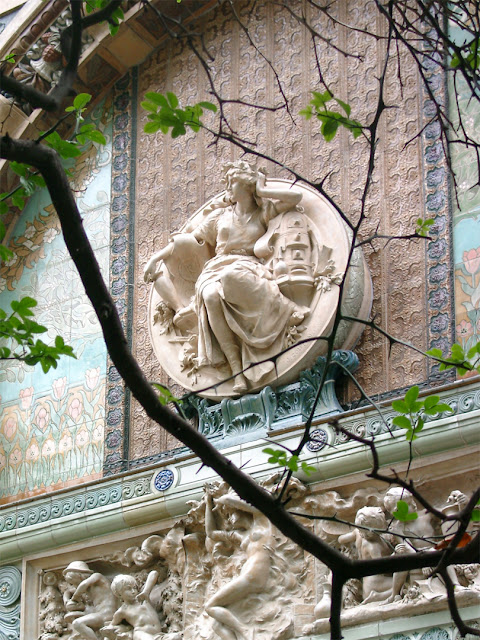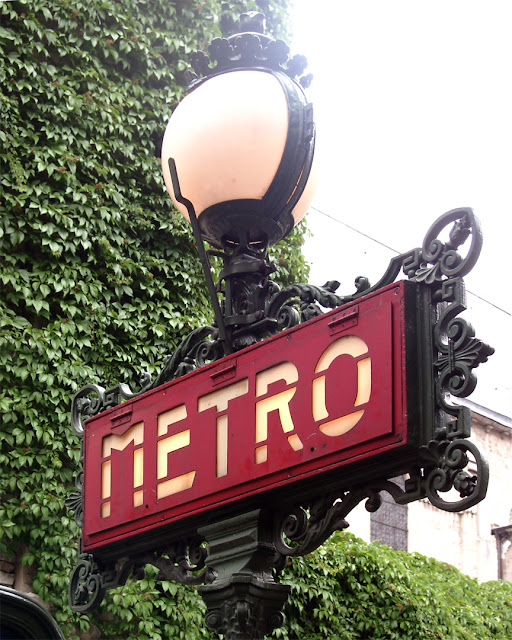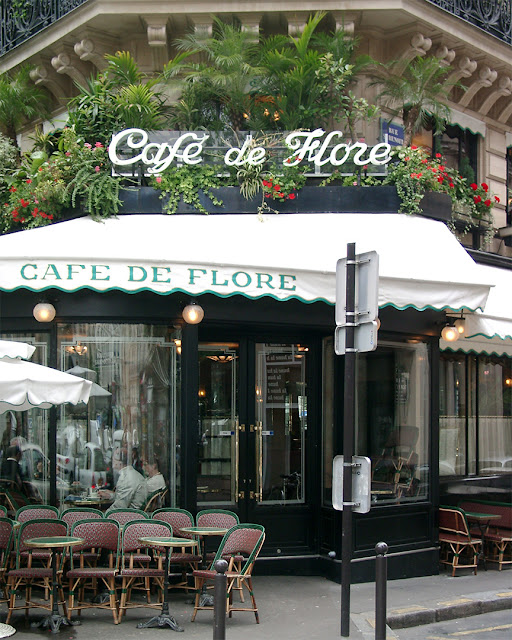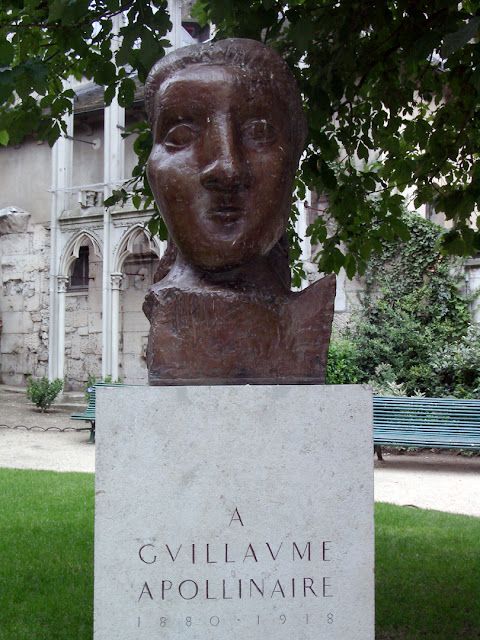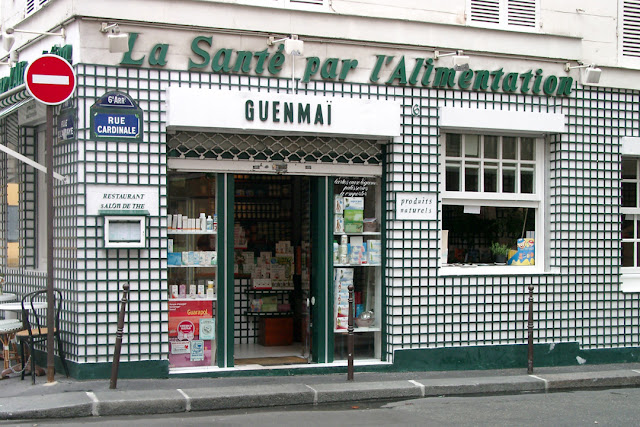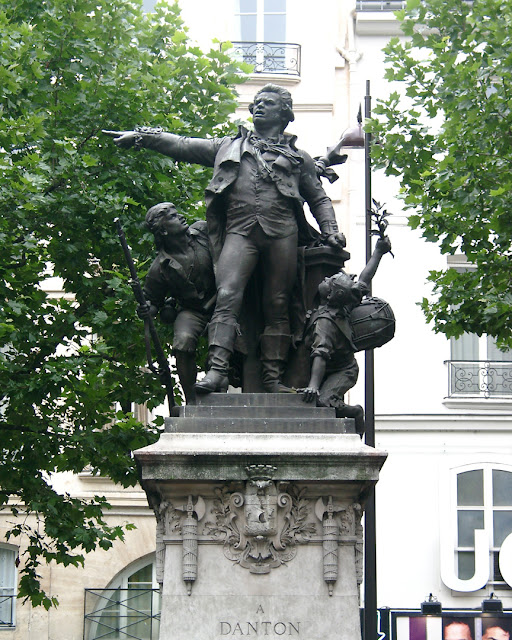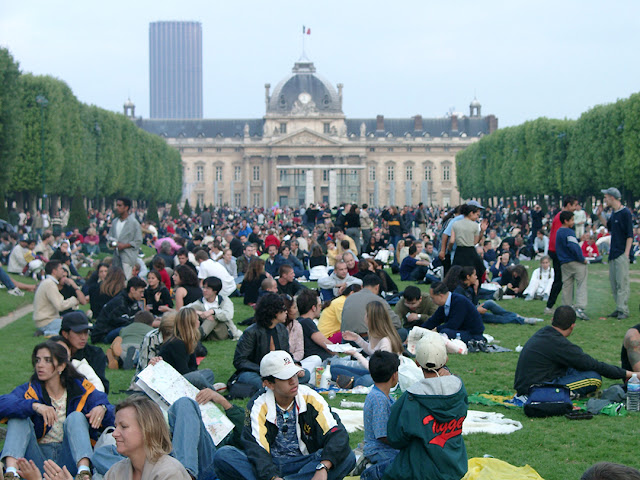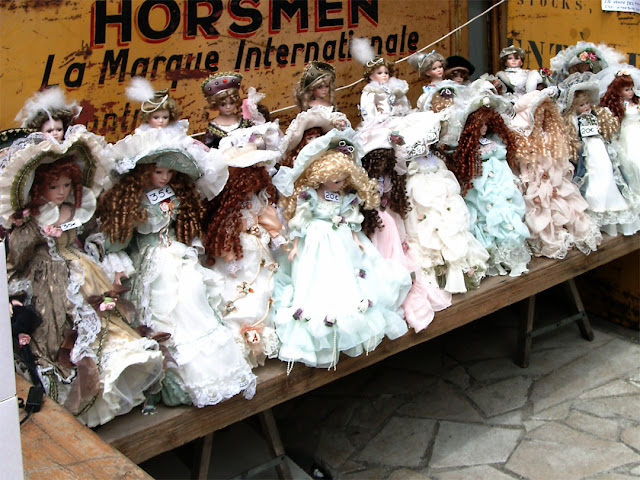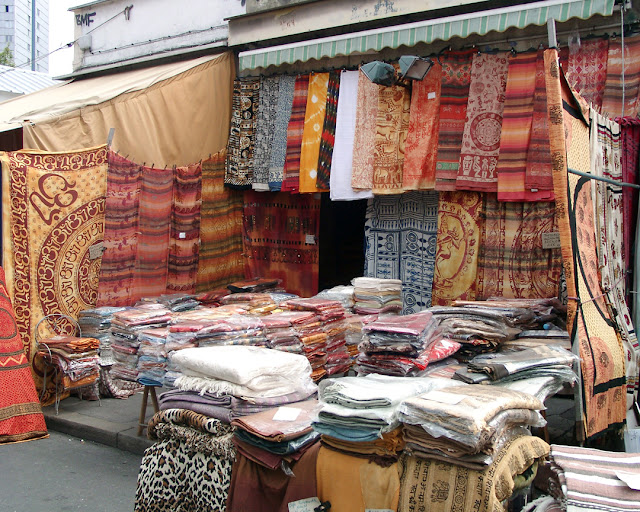Monday, June 30, 2003
Sunday, June 29, 2003
Rue Chanoinesse
École Nationale de la Magistrature (French National School for the Judiciary)
Rue Chanoinesse, Île de la Cité
Quartier Notre-Dame, 4th arrondissement
Paris, July 2002
“Rue Chanoinesse is a street on the Île de la Cité, in the heart of Paris, in the 4th arrondissement. Located on the eastern tip of the Île de la Cité, facing the Île Saint-Louis, the street owes its name to the many canons who lived there. These members of the clergy were attached to the service of the nearby Notre-Dame Cathedral. A canon's house built in 1512 can still be seen at number 24. Rue Chanoinesse was the main artery of the Notre-Dame cloister, a district delimited by the metropolitan church, the Hôtel-Dieu and the river, which ‘formed like another island, another city, in the island of the Cité’. Located next to the cathedral , it bears this name in memory of the Canons' residence.” (Rue Chanoinesse, Wikipedia)
Saturday, June 28, 2003
Au Vieux Paris d'Arcole
Au Vieux Paris d'Arcole
Rue Chanoinesse
Île de la Cité
Quartier Notre-Dame, 4th arrondissement
Paris, July 2002
“The Rue Chanoinesse dates from the Carolingian era. In the Middle Ages, access to the Notre-Dame cloister, controlled by four gates that were closed at night, was forbidden to those outside the community of canons, and especially to women. This ‘canonical enclosure’ consisted of properties exempt from taxes by virtue of an edict of Charlemagne. In the 15th century, nobles obtained the right to rent the canons' houses, with the benefits of immunity from the king's justice and tax exemption. The current Rue Chanoinesse was once known, between Rue de la Colombe and Rue d'Arcole, as ‘Rue des Marmousets’ (which should not be confused with the current street of the same name located in the 13th arrondissement), or in 1387, the affair of Rue des Marmousets is said to have taken place there at the corner of Rue des Deux-Hermites. The Porte Marmouset, which was still visible in 1791, stood at the corner of Rue de la Colombe.” (Rue Chanoinesse, Wikipedia)
Friday, June 27, 2003
Memorial tablet
Memorial tablet to the British Empire dead of the First World War
Notre-Dame de Paris
Île de la Cité
Quartier Notre-Dame, 4th arrondissement
Paris, July 2002
“Between 1923 and 1936, the Imperial War Graves Commission erected a series of memorial tablets in French and Belgian cathedrals to commemorate the British Empire dead of the First World War. The tablets were erected in towns in which British Army or Empire troops had been quartered. The prototype Commission memorial tablet, placed in Amiens Cathedral in 1923 alongside tablets previously erected to other Empire troops, was dedicated to the 600,000 dead of Britain and Ireland. The subsequent design of the Commission's tablet brought together the British Royal Coat of Arms with those of India and the imperial dominions: South Africa, Australia, Canada, New Zealand, and Newfoundland. The tablet's inscription, written by Rudyard Kipling, referred to the ‘million dead’ of the Empire. Produced by Reginald Hallward to a design by architect H. P. Cart de Lafontaine, the tablets were erected in twenty-eight cathedrals and churches, twenty-three in France and five in Belgium, with the bilingual inscriptions in each country in English and French, and English and Latin respectively. They were unveiled by a range of dignitaries, including members of the royal family, diplomats, politicians, and British Army generals who had commanded troops on the Western Front.” (Memorial tablets to the British Empire dead of the First World War, Wikipedia)
Thursday, June 26, 2003
Children's Choir
Children's choir
Notre-Dame de Paris (Our Lady of Paris)
Île de la Cité
Quartier Notre-Dame, 4th arrondissement
Paris, July 2002
Wednesday, June 25, 2003
Tuesday, June 24, 2003
Jacques de Molay
Plaque commemorating Jacques de Molay
Square du Vert-Galant, Île de la Cité
Quartier Saint-Germain-l'Auxerrois, 1st arrondissement
Paris, July 2002
“When the Pont Neuf, was completed the bridge was at the west end of the Ile de la Cité, overlooking the river. Two small islands originally lay just west of the bridge; the Île a la Gourdaine or Island of the Patriarch, and the Ile aux Juifs, which had been the site of the persecution and execution of Jews, and which on 18 March had been the execution site of Jacques de Molay, the head of the Knights Templar, as well as another Templar leader, Geoffroi de Charney. Both were burned at the stake for heresy. A plaque commemorating Molay's execution sits at the entrance to the square, which now occupies the land.” (Square du Vert-Galant, Wikipedia)
Monday, June 23, 2003
Square du Vert-Galant
Square du Vert-Galant and the Pont Neuf
Equestrian statue of Henry IV
Île de la Cité
Quartier Saint-Germain-l'Auxerrois, 1st arrondissement
Paris, July 2002
“The Square du Vert-Galant is a small, triangular park pointing downstream located at the western tip of the Ile de la Cité, next to the Pont Neuf, in the First Arrondissement of Paris. It was created in 1884 by joining two small islands to the larger island. The Square du Vert-Galant earns its name from Henry IV of France, who was nicknamed Vert-Galant (Green Gallant) due to having numerous mistresses despite his advanced age at the time. Additionally, there is the large bronze Equestrian statue of Henry IV overlooking the square, now oxidized to a green hue.” (Square du Vert-Galant, Wikipedia)
Sunday, June 22, 2003
Hôtel de Ville
Hôtel de Ville
Place de l'Hôtel-de-Ville
Quartier Saint-Merri, 4th arrondissement
Paris, July 2002
“The Hôtel de Ville (City Hall) is the city hall of Paris, France, standing on the Place de l'Hôtel-de-Ville – Esplanade de la Libération in the 4th arrondissement. The south wing was originally constructed by François I beginning in 1535 until 1551. The north wing was built by Henry IV and Louis XIII between 1605 and 1628. It was burned by the Paris Commune, along with all the city archives that it contained, during the Commune's final days in May 1871. The outside was rebuilt following the original design, but larger, between 1874 and 1882, while the inside was considerably modified. It has been the headquarters of the municipality of Paris since 1357. It serves multiple functions, housing the local government council, since 1977 the Mayor of Paris and her cabinet, and also serves as a venue for large receptions.” (Hôtel de Ville, Wikipedia)
Saturday, June 21, 2003
Bazar de l'Hôtel de Ville
Bazar de l'Hôtel de Ville
Place de l'Hôtel-de-Ville
Quartier Saint-Merri, 4th arrondissement
Paris, July 2002
“The BHV or Bazar de l'Hôtel de Ville is a French department store chain with its flagship location at 52 Rue de Rivoli in the 4th arrondissement of Paris, facing the Hôtel de Ville (City Hall) where it gets its name, the flagship is served by the Hôtel de Ville Metro station. The chain is owned by Groupe SGM and operates nine full line stores alongside four specialised stores next to its flagship location.” (BHV, Wikipedia)
Friday, June 20, 2003
Fontaine Saint-Michel
Fontaine Saint-Michel by Gabriel Davioud, 1860
Place Saint-Michel
Quartier de la Monnaie, 6th arrondissement
Paris, July 2002
“The Fontaine Saint-Michel is a monumental fountain on the Place Saint-Michel in the 5th arrondissement of Paris. It was constructed in 1858–1860 during Haussmann's renovation of Paris following plans by architect Gabriel Davioud. It has been listed since 1926 as a monument historique by the Ministry of Culture. The Fontaine Saint-Michel was part of the great project for the reconstruction of Paris overseen by Baron Haussmann during the French Second Empire. In 1855 Haussmann completed an enormous new boulevard, originally called the Boulevard de Sébastopol-rive-gauche, now called the Boulevard Saint-Michel, which opened up the small place Pont-Saint-Michel into a much larger space. Haussmann asked the architect of the service of promenades and plantations of the prefecture, Gabriel Davioud, to design a fountain which would be appropriate in scale to the new square. As the architect of the prefecture, he was able to design not only the fountain but also the facades of the new buildings around it, giving coherence to the square, but he also had to deal with the demands of the prefet and city administration, which was paying for the project.” (Fontaine Saint-Michel, Wikipedia)
Thursday, June 19, 2003
Winged dragon
Winged dragon by Henri Alfred Jacquemart
Fontaine Saint-Michel
Place Saint-Michel
Quartier de la Monnaie, 6th arrondissement
Paris, July 2002
“ Davioud's original project was for a fountain dedicated to peace, located in the center of the square. The prefect authorities rejected this idea and asked him instead to build a fountain to hide the end wall of the building at the corner of the Boulevard Saint-Michel and the Rue Saint-André-des-Arts. This forced Davioud to adapt his plan to the proportions of that building. The next design made by Davioud in 1856 provided the architectural structure of the fountain; a facade divided into four horizontal levels, similar to a triumphal arch, with four Corinthian columns on high socles framing the central niche. The main cornice is surmounted by a French Renaissance design feature, an inscribed tablet in a grand architectural framing. As the revised site was just off the axis of the bridge, Davioud created a visual compromise in a series of shallow bowed basins through which the water issuing from the rock under the supine body of Saint Michael's adversary spills. The water ends in a basin sunk into street level, with a curving front edge that softens the line of the monument's architectural base.” (Fontaine Saint-Michel, Wikipedia)
Wednesday, June 18, 2003
Church of Saint-Séverin
Église Saint-Séverin (Church of Saint-Séverin)
Rue des Prêtres Saint-Séverin
Quartier de la Sorbonne, 5th arrondissement
Paris, July 2002
“The Church of Saint-Séverin (Église Saint-Séverin) is a Catholic church in the 5th arrondissement, or Latin Quarter, of Paris, on the lively tourist street Rue Saint-Séverin. It was constructed beginning in 1230, then, after a fire, rebuilt and enlarged in the 15th to 17th centuries in the Flamboyant Gothic style. It was the parish church for students at the University of Paris, and is one of the oldest churches that remains standing on the Left Bank. The church took its name from Saint Séverin of Paris, a devout hermit who lived at the site in the 6th century, and died in about 540. One of his pupils was Clodoald or Saint Cloud, a Merovingian prince who quit the royal family to himself become a monk and hermit, who also later became a Saint. After the death of Severin, a chapel was erected on the site of his cell, believed to be near the oratory of Saint Martin in the present church. This chapel was destroyed during the Norman invasions in the 9th century, then rebuilt in the Romanesque style in the 11th century. Several Sarcophogi from a cemetery of the Merovingian dynasty were discovered during rebuilding on the site in the 19th century.” (Saint-Séverin, Wikipedia)
Tuesday, June 17, 2003
Nostradamus cadeaux
Nostradamus cadeaux
Rue Saint-Julien-le-Pauvre
Quartier de la Sorbonne, 5th arrondissement
Paris, July 2002
“Rue Saint-Julien-le-Pauvre is a street located in the Sorbonne district of the 5th arrondissement of Paris. This street, which began at rue de la Bûcherie and ended at rue Galande, was located in the former 12th arrondissement of Paris. Rue Saint-Julien-le-Pauvre is accessible via metro line 10 at the Maubert-Mutualité station, as well as at the Saint-Michel station, both located nearby. The street takes its name from the old road leading to the church of Saint-Julien-le-Pauvre, which was then located at number 11.” (Rue Saint-Julien-le-Pauvre, Wikipedia)
Monday, June 16, 2003
Boulangerie pâtisserie
Boulangeries pâtisserie
Rue Monge
Quartier Saint-Victor, 5th arrondissement
Paris, July 2002
“Rue Monge is a street located in the Saint-Victor and Jardin-des-Plantes districts of the 5th arrondissement of Paris. It was created in the 1860s. Rue Monge is accessible via metro line 7 at the Censier-Daubenton and Place Monge stations and via line 10 at the Cardinal Lemoine and Maubert-Mutualité stations. The street takes its name from Gaspard Monge (1746-1818), French mathematician, one of the founders of the École Polytechnique.” (Rue Monge, Wikipedia)
Sunday, June 15, 2003
Institut du monde arabe
Institut du Monde Arabe (Arab World Institute)
Rue des Fossés Saint-Bernard
Quartier Saint-Victor, 5th arrondissement
Paris, July 2002
“The Institut du Monde Arabe (Arab World Institute; abbr. IMA) is an organisation founded in Paris in 1980 by France with 18 Arab countries to research and disseminate information about the Arab world and its cultural and spiritual values. The Institute was established as a result of a perceived lack of representation for the Arab world in France, and seeks to provide a secular location for the promotion of Arab civilization, art, knowledge, and aesthetics. Housed within the institution are a museum, library, auditorium, restaurant, offices and meeting rooms. The IMA is located in a building known as the Institut du Monde Arabe, the same name as the institute, on Rue des Fossés Saint Bernard in the 5th arrondissement of Paris, France. Originally, the project was conceived in 1973 by President Valéry Giscard d'Estaing. The museum was constructed between 1981 and 1987 under the presidency of French President Francois Mitterrand as part of his urban development series entitled, the ‘Grands Projets’.” (Institut du Monde Arabe, Wikipedia)
Saturday, June 14, 2003
Tour Zamansky
Tour Zamansky by Édouard Albert, 1970
Campus Pierre-et-Marie-Curie
Quartier Saint-Victor, 5th arrondissement
Paris, July 2002
“The Zamansky Tower, also known as the Jussieu Tower, is a building in the 5th arrondissement of Paris. Located in the middle of the Pierre and Marie Curie campus (Jussieu), it houses the administrative offices of Sorbonne University. It is named after Marc Zamansky, Dean of the Faculty of Sciences of Paris from 1963 to 1970. It is commonly called the ‘Jussieu Tower’ by Parisians, and the ‘Central Tower’ or simply ‘the Tower’ by campus users. The term ‘the Tower’ is also often used metonymically to refer to the administrative offices themselves. Standing 90 meters tall, it is the 115th tallest building in Île-de-France. It comprises 28 levels: a ground floor, two mezzanines, 24 ordinary floors, and a technical floor. On the roof of the building are four masts supporting various antennas, bringing the total height to 93 meters.” (Tour Zamansky, Wikipedia)
Friday, June 13, 2003
Odéon-Théâtre de l'Europe
Odéon-Théâtre de l'Europe
Rue Corneille
Quartier de l'Odéon, 6th arrondissement
Paris, July 2002
“The Odéon-Théâtre de l'Europe (European Music Hall; formerly the Théâtre de l'Odéon ‘Music Hall’) is one of France's six national theatres. It is located at 2 rue Corneille in the 6th arrondissement of Paris on the left bank of the Seine, next to the Luxembourg Garden and the Luxembourg Palace, which houses the Senate. The third and present structure, designed by Pierre Thomas Baraguay, was opened in September 1819. In 1990, the theater was given the sobriquet ‘Théâtre de l'Europe’. It is a member theater of the Union of the Theatres of Europe.” (Odéon-Théâtre de l'Europe, Wikipedia)
Thursday, June 12, 2003
Marché Saint-Germain
Marché Saint-Germain (Saint-Germain market)
Rue Lobineau
Quartier de l'Odéon, 6th arrondissement
Paris, July 2002
“The marché Saint-Germain (Saint-Germain market) is a covered market built between 1813 and 1817 and located in Paris in the Odéon district (6th arrondissement). The Saint-Germain market was built on a rectangular plan of 92 meters by 75, framed by the streets of Seine to the east, Lobineau to the south, Mabillon to the west and Clément to the north. Originally, the Saint-Germain market and fair both depended on the Abbey of Saint-Germain-des-Prés. In 1511, Abbot Guillaume Briçonnet had a double-roofed market hall built, which could accommodate 300 merchants and which was destroyed in a fire in 1762.” (Marché Saint-Germain, Wikipedia)
Wednesday, June 11, 2003
Kiosque à journaux
Kiosque à journaux (Newsstand)
Boulevard Saint-Germain?
Quartier Saint-Germain-des-Prés, 6th arrondissement
Paris, July 2002
Tuesday, June 10, 2003
Portique Sèvres
Portique Sèvres by Jules-Félix Coutan, 1900
Square Félix Desruelles
Boulevard Saint-Germain
Quartier Saint-Germain-des-Prés, 6th arrondissement
Paris, July 2002
“The Portique monumental Jules-Coutan (also called the Portique Art nouveau or the Portique de la manufacture de Sèvres) is a sandstone portico located in the Félix-Desruelles square, in the 6th arrondissement of Paris, France. Designed by the architect Charles-Auguste Risler (1864-1937) and the sculptor Jules Coutan (1848-1939), and produced at the Sèvres Manufactory, it adorned the Pavilion of French Manufactures at the 1900 Universal Exhibition. Safeguarded, it was moved to a façade adjoining the square.” (Portique monumental Jules-Coutan, Wikipedia)
Monday, June 9, 2003
Totem Val d'Osne
Métro signpost, Val d'Osne variant
Boulevard Saint-Germain
Quartier Saint-Germain-des-Prés, 6th arrondissement
Paris, July 2002
“Also known as masts or totems, distinctive Métro signposts were a 1920s innovation of the Nord-Sud company. In the early years, two styles arrived in succession. The Val d'Osne variant (named after an iron foundry, and visible at Saint Paul) consists of a globe-shaped lamp atop a ‘MÉTRO’ sign surrounded by an ornate cast-iron frieze. The simpler Dervaux lampposts (named after their architect) became common in the 1930s, following the contemporary trend away from decorative embellishment.” (Architecture of the Paris Métro, Wikipedia)
Sunday, June 8, 2003
Café de Flore
Café de Flore
Boulevard Saint-Germain
Quartier Saint-Germain-des-Prés, 6th arrondissement
Paris, July 2002
“The Café de Flore is one of the oldest coffeehouses in Paris, celebrated for its famous clientele, which in the past included high-profile writers and philosophers. It is located at the corner of Boulevard Saint-Germain and Rue Saint-Benoît, in Saint-Germain-des-Prés in the 6th arrondissement. The nearest underground station is Saint-Germain-des-Prés, served by line 4 of Paris Métro. The coffeehouse still remains a popular hang-out spot for celebrities and its status attracts numerous tourists.” (Café de Flore, Wikipedia)
Saturday, June 7, 2003
La tête de Dora Maar
Monument to Guillaume Apollinaire by Pablo Picasso
“La tête de Dora Maar” (The head Dora Maar)
Square Laurent Prache
Quartier Saint-Germain-des-Prés, 6th arrondissement
Paris, July 2002
“Picasso's monument to his poet friend Guillaume Apollinaire never fully materialized as planned, but it led to groundbreaking wire sculptures called ‘Figures’, created with Julio González as ‘drawings in space’ in 1928, exploring ‘nothingness’. Though Picasso's radical designs for the tomb were rejected, these experimental iron works, echoing Apollinaire's literary themes, inspired a new era of metal sculpture, with a large-scale version eventually placed in Paris's Square Saint-Germain-des-Prés as a tribute.” (Monument to Guillaume Apollinaire, AI Overview)
Friday, June 6, 2003
Guenmaï
Guenmaï, la santé par l'alimentation
Restaurant, salon de the
Rue Cardinale
Quartier Saint-Germain-des-Prés, 6th arrondissement
Paris, July 2002
“Rue Cardinale is a street located in the Saint-Germain-des-Prés district of the 6th arrondissement of Paris, France. Rue Cardinale is served nearby by line 10 at the Mabillon station. This L-shaped street connects Furstemberg Street and Rue Abbaye. The name of this road refers to Cardinal de Furstemberg (1629-1704), commendatory abbot of Saint-Germain-des-Prés (from 1697 to 1704), through whose care ‘it was opened in the enclosure of the abbey’ of which he was the titular abbot. An old road opened on the grounds of the Abbey of Saint-Germain-des-Prés in 1699, the road took the name ‘rue du Tribunal’ in 1804, then ‘rue Guntzbourg’ in 1806; it took its current name in 1815.” (Rue Cardinale, Wikipedia)
Thursday, June 5, 2003
Monument à Danton
Monument à Danton (Monument to Danton) by Auguste Paris, 1891
Place Henri-Mondor
Quartier de l'Odéon, 6th arrondissement
Paris, July 2002
“The Monument to Danton is a bronze sculpture created by Auguste Paris in 1891. The monument depicts Georges-Jacques Danton, a member of the National Convention and revolutionary, addressing the people. The statue was commissioned by the City of Paris in 1887 for the centenary commemorations of the French Revolution of 1789. A competition was held, and Auguste Paris's design was selected. The bronze was cast by Thiébaut . The pedestal was designed by the architect Alexandre Lépouzé. The monument is located in the 6th arrondissement of Paris, at 97 Boulevard Saint-Germain, Place Henri-Mondor. The sculptural group depicts Danton standing in a tribune's pose, about to deliver a speech. Beside him, two young conscripts in arms look at him. The statue rests on a pedestal: on the front are inscribed ‘À Danton - La ville de Paris - Ce monument a été érigé à la place qu'occupait la maison habitée par Danton dans la partie aujourd'hui démolie de la cour du commerce’ (To Danton - The City of Paris - This monument was erected on the site of the house inhabited by Danton in the now demolished part of the Cour du Commerce).” (Monument à Danton, Wikipedia)
Wednesday, June 4, 2003
Waiting for the fireworks
Waiting for the fireworks
Champ-de-Mars
Quartier du Gros-Caillou, 7th arrondissement
Paris, July 2002
“A traditional event for Parisians, residents of the Île-de-France region, and visitors to Paris in July, the fireworks display organized for the French National Day by the City of Paris is set off on the evening of July 14 from the Eiffel Tower. It is an opportunity to enjoy one of the most impressive and innovative pyrotechnic shows in the world. Every year on July 14, during the National Day celebrations (Bastille Day) and fireworks display organized by the City of Paris, the Eiffel Tower takes center stage.” (Fireworks display on 14 July, La Tour Eiffel)
Tuesday, June 3, 2003
Poupées
Marché aux puces de Saint-Ouen
Rue des Rosiers
Saint-Ouen
Paris, July 2002
“The flea markets are mainly organized around the rue des Rosiers, the porte de Clignancourt and the porte de Montmartre. These three places correspond to the triptych that forms this activity and this district. We find antique dealers around Rue des Rosiers (Saint-Ouen-sur-Seine) and Rue Paul Bert.” (Marché aux puces de Saint-Ouen, Wikipedia)
Monday, June 2, 2003
Nappes
Marché aux puces de Saint-Ouen
Rue des Rosiers
Saint-Ouen
Paris, July 2002
“The origins of the flea market date back to 1885, following the decree by Prefect Eugène Poubelle prohibiting the dumping of garbage at the entrances of buildings in Paris. Ragpickers settled in the Malassis plain, a piece of land adjacent to the fortifications of Paris. This plain is part of the Zone, a 250-meter-wide strip of land where construction is prohibited around the Thiers fortifications, built in 1844. All construction is forbidden in this zone for reasons of military security. On these vacant lots, shantytowns of a very poor population will accumulate.” (Marché aux puces de Saint-Ouen, Wikipedia)
Sunday, June 1, 2003
Le cheval
Marché aux puces de Saint-Ouen
Rue des Rosiers
Saint-Ouen
Paris, July 2002
“The Saint-Ouen flea market is a collection of markets held in a district of the town of Saint-Ouen-sur-Seine, on the outskirts of Paris. These various markets bring together nearly 2,000 vendors across 7 hectares. They primarily offer antiques, but also clothing and bric-a-brac. It is the world's largest art and antiques market, attracting 5 million visitors annually.” (Marché aux puces de Saint-Ouen, Wikipedia)
Subscribe to:
Comments (Atom)

